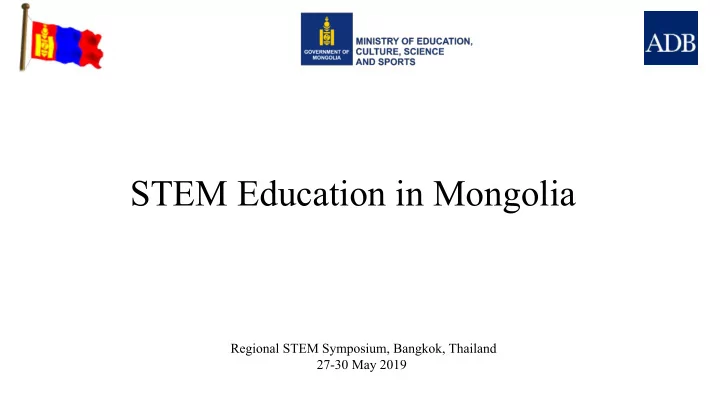

STEM Education in Mongolia Regional STEM Symposium, Bangkok, Thailand 27-30 May 2019
Topics for Today • Brief information about Mongolia • STEM Curriculum • Education system • Curriculum innovation • Teachers • Teacher training programs • Project promotions for STEM education
Mongolia – The land of eternal blue sky. Mongolia is 18 th largest country in the world Traditional nomadic lifestyle.
Ulaanbaatar is the capital city.
Traditional puzzle games
General Information Country: Mongolia Population size: 3,238,479 Land Area 1,564,116 km2 Natural conditions Four seasons (- 50° С ; + 50° С ) Size of K-12 population: 2019 572,752 F-286,014 Main foreign language(s) taught: Russian English Schooling survival rates (K-12): 81% % of students who pursue tertiary 85,4% education: Schooling Gender ratios: 2:1 M-286,738 F-286,014 Teacher-student ratios: 1:20 Student-572,752 Teacher-29,242 Resource: National Statistics office of Mongolia http://www.en.nso.mn/ Education sector information system web site https://www.esis.edu.mn/
Education system Education Curriculum Grades Age Years 1 Pre-school Pre-school education 2-5 4 education curriculum 2 Primary Primary education core 1-4 6-10 5 education curriculum 3 Basic Basic education core 5-9 11-14 4 education curriculum 4 Secondary Senior secondary education 10-12 15-17 3 education core curriculum Vocational Competency based 10-12 15-17 3 education curriculum 5 Bachelor’s Different curriculums for 4 every university Master’s 2 Doctorate 3-4
K-12 curriculum innovation timeline Primary and secondary school curriculum Average 10 13 13 10 11 8 9 23 1998 1963 1985 1921 1934 1945 1955 1972 5 6 4 2013 2009 2004 The top causes of innovation : • World tendency (Quality Education) Competency based • Core K12 national standards curriculum curriculum • New requirements for socio-economic The 4 pillars of • Cambridge development Education curriculum • Changes in the structure and system of general education schools
K-12 curriculum innovation timeline Education Curriculum Curriculum ISSUES Level innovation Developing core curriculums with national features and align with internationally recognized Primary Primary education 2014 curriculums Education core curriculum • The phase of curriculum Cambridge • Tendency of the educational goals of science Basic Basic education core 2015 (Scientific competence, Scientific literacy) Education curriculum Senior Senior secondary 2016 Secondary education core curriculum
STEM part of national curriculums Education Imp National K-12 curriculum Level Level Objective Content Methodology Tools (Equipment) Primary Piloting Scientific Mechanic and Static models Integrated methodology (Math, Mongolian • Artec Education enquiry (Bridge, car, cranes etc.) language, Human and Science, Design and • Fischertechnik technology) Basic - Education Senior Piloting Scientific • Modern physical technology • Interdisciplinary Secondary enquiry • Electronics • Student-Centered • Digital electronics • Active learning • Applied mathematics • Inquiry based learning • Media design • Intentional teaching • Nanotechnology • Playful and Challenging • Teaching ICT based chemistry Higher Starting Scientific Mechanic and Static models Integrated methodology (Math, Mongolian • Artec Education at enquiry (Bridge, car, cranes etc.) language, Human and Science, Design and • Fischertechnik MNUE technology)
21 century skills at the SSE core curriculum STEM subjects Chemistry Physics Design and technology Learning strategy Teaching and Learning Planning methodology strategy • Team work • Creative thinking • Course work • Task based Learning Models • Creation • Learning to solve problems model • Investigation • Experimentation
Teachers (K-12) Total number of teachers: 31,772 % of Teachers with Master’s Degrees and above: 4621 % of Teachers with a Bachelor’s Degree 22,888 % of Teacher with less than a Bachelor’s Degree: 3809 % of teachers teaching at least one STEM subject (i.e. 5016 Science, engineering, Technology, Mathematics) Regardless of the property type, provided professional development trainings to preschool and secondary school teachers’ every five years using state budget. /Article 40.8, Law on primary and secondary education/ Institute of Teacher’s Professional Development organize nationwide retraining courses for teachers.
Aim of MNUE curriculum : Curriculum aims to prepare teachers and educational staff who have the basic scientific knowledge and theoretical and methodological skills for developing him/herself further and organize scientifically training activities. Schools and departments Teacher training Curriculums Credits Duration (Year) School of Mathematics and Natural Mathematics, Physics, Biology, Chemistry, Informatics, 123 4 Sciences Geography, Health Education, Ecology “Integrated methodology” 2 credits/ Elective School of Humanities and Social Social Science, History, Mongolian Language And 122-150 4 Sciences Literature, Foreign Language (English, Russian, Chinese, German, Japanese) School of Educational Studies Psychologist, Lifelong Education, Special Needs, Social 122 4 Worker Teachers school Primary Education Teachers, Music Teacher, 122-124 4 “Integrated methodology” 2 credits/ compulsory School of Fine Arts and Technology Fine Art, Cartography, Design And Technology 122 4 School of Physical Education Physical science, Trainer 122-130 4 School of Pre-School Education Pre-school, Methodologist 122 4 Teachers School in Arkhangai Pre-school, Mongolian Language And Literature, Primary 122 4 Province education, Informatics, English, Social worker
Way for Integration of STEM into national K-12 curriculum • Primary Piloting • Higher • Policy note • Integration of STEM into national K-12 Develop curriculum • Nationwide level • Prepare trainers Implement • Teacher trainings • Prepare tools (equipment)
Project promotions for STEM education Implementation K-12 level Higher Education level information Date 2016 2016-2019 2015-2017 2019 Organizer/ MECSS and “Skills for Employment “ Higher Education Reform Project”/ADB Finance ITPD/World bank Project”/ADB Level Nationwide Mongolian National University of Education Teacher training university's Action Trainings Trainings • Trainings • Online training • ToT • ToT • “Integrated methodology” Teacher • Distance training • • • Nationwide Nationwide training training curriculum Handbook develop Face to face training • training STEM Digital lessons /DVD/ • STEM kits /Secondary school under MSUE/ • STEM education training books Target Primary education SSE level STEM • MNUE lecturers-188 • Teachers -150 group teachers (33%) subject's teacher (80%) • General education teachers-44 • Student -150 • MNUE students-213
Thank you very much for your attention^^
Recommend
More recommend